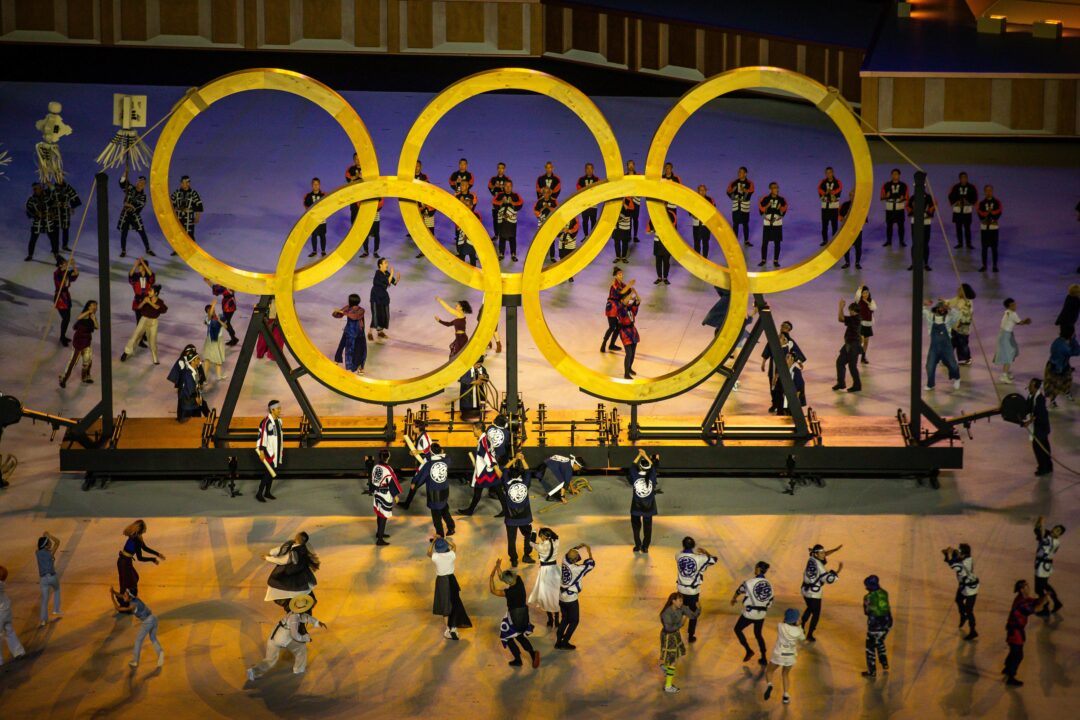Organizers of the Tokyo 2020 Olympic Games have submitted their final Games report. The report is mostly one of celebration, highlighting the positives of the Games while presenting a few lessons that they hope to “solidify” future Games. The reports rarely include any downsides or negatives of the presentation of the Games.
Rio 2016 organizers are the only in the history of the modern Olympic Games to not file an official report.
The report is full of data and details about Games delivery: a spectacular summary of information that itself takes a mountain of effort to put together.
The Tokyo 2020 Olympic Games will always be remembered as the world’s first back to major international competition amid the COVID-19 pandemic. That presented logistical challenges never before seen by the Olympic Games and requirements.
COVID-19 Data
- Approximately 85% of Olympic and Paralympic Village residents were vaccinated ahead of the Games – a rate much higher than the world at large at the time.
- The IOC and its partners distributed over 100,000 free doses of COVID-19 vaccines to more than 50,000 Olympic Games participants across 25 National Olympic Committees.
- More than 675,000 COVID-19 tests were administered during the Games, an average of 675,000 per day. There was a cumulative .02% positivity rate, which is lower than almost anywhere else in the world at the time.
Equality, Diversity, and Olympic Scholarships
- 48% of the Olympic athletes in Tokyo 2020 were female, which made it the most gender-balanced Olympic Games to date.
- 836 Olympic Solidarity Scholarship Holders competed. They competed in 12 sports and won 27 gold, 32 silver, and 42 bronze medals.
- 143 scholarship holders were chosen as flagbearers at the opening ceremonies.
- 3 NOCs won their first Olympic medals: Burkina Faso, Turkmenistan, and San Marnio.
- 3 NOCs won their first Olympic gold medals: Bermuda, Philippines, and Qatar.
- There were 18 mixed team events, the most ever.
Engagement Data
- The IOC touts 3.05 billion unique viewers across television and digital platforms. That’s roughly 38% of the world’s population.
- As drops in television ratings were reported by many broadcasters, especially in the United States, the IOC touted growth in digital (aka internet & social media) engagement.
- 6.1 billion engagements on IOC’s social media handles
- More than 196 million unique users on IOC web and app platforms, a three-fold increase from Rio 2016
- 3,3000 hours of coverage and 10,200 hours of content produced: a 44% increase from Rio 2016.
- 28 billion video views on Olympic broadcast partners’ digital platforms, a 139% increase from Rio 2016
Environmental Impact
- 217 local businesses committed to 4.38 million tonnes of CO2 reduction via carbon credits, offsetting the estimated 1.96 million tonnes of CO2 emissions from the Games.
- The Olympic medals were made from 100% recycled materials, including the contents of 6.21 million mobile phones and 79,000 tonnes of donated electronics.
- 99% of non-consumable items produced for the Games were reused or recycled.
Economic Results
- With Olympic Games and other international sporting events notoriously spiraling over-budget, Tokyo reversed that trend: they saved $2.2 billion from a venue masterplan review and $2.1 billion through the application of the Olympic Agenda 2020+5 and the New Norm plans, and an additional $280 million in savings from optimizations and simplifications following postponement.
What Was Learned
The nine measures have been split into three areas:
- Organization
1 – Refine the role of the Coordination Commission to best support Organising Committees and stakeholders.
2 – Build a bespoke Games plan to establish roles, responsibilities and a roadmap to deliver the vision and objectives for each Games edition.
3 – Establish a Games Optimisation Group.
4 – Further increase cooperation between the IOC and the International Paralympic Committee (IPC) to better support delivery of the Games.
5 – Organising Committees and the IOC to shift earlier to operational mode.
- Solutions
6 – Explore and invest in reusable solutions to support efficient delivery and offer value to Organising Committees across multiple Games editions.
7 – Use data to “right-size” Games delivery and improve the experience.
- Engagement
8 – Continuously develop the Games experience – physical and digital – to meet the changing interests and behaviours of stakeholders and audiences.
9 – Increase dialogue in the lead-up to, during and after the Games to better understand and engage with local communities.

I wish they’d done a breakdown of the viewership of each sport, can’t seem to find that info anywhere, I read somewhere that the 2011 Swimming world champs was watched by 2.5 billion people, would love to know what the tokyo viewership for swimming was, or the 2019 world champs
Why does the IOC report read like something out of a 1970’s Politburo report on “the great success of the entire Revolutionary Movement’? I mean, if one knew nothing else, you’d have to conclude that the IOC is the best darn organization in the world! The level of statistical irrelevance and just plain ‘nonsense’ is mind-boggling. I’m so worn out reading this dreck, I’m taking a nap!
Yes, you learn more in life from your mistakes than your self-declared ‘triumphs’….. That being said Tokyo was pretty amazing considering the circumstances, and we were lucky to have it at all. I think that has more to do with the tenacity, abilities and generosity of Japan than the IOC.
Booolshot